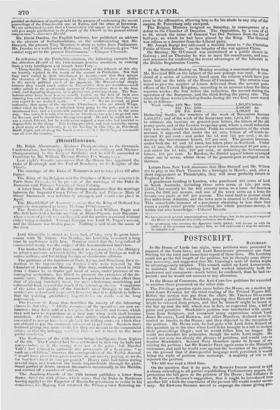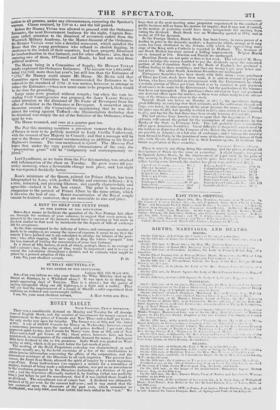POSTSCRIPT.
SATURDAY.
In the House of Lords last night, some petitions were presented in support of the Corn-laws; and Lord ROSEBERRY presented one from Stirling for the total and immediate repeal of those laws. His Lordship could not go the full length of the petition, but lie thought some altera- tion necessary, and suggested that Mr. Canning's scale of duties might be advantageously adopted. This remark called up Lord ASHBURTON, to. maintain that the existing laws had worked admirably both for landowner and consumers—much better, lie confessed, than he had ex- pected ; and he would not consent to any alteration.
In the House of Commons, the Anti-Corn-law petitions far exceeded in number those presented on the other side.
The Privilege question again came before the House, on a motion by Lord Join RUSSELL for the third reading of the Printed Papers Bill. Before the motion was put front the chair, Mr. THOMAS Dustiest:min presented a petition from Stockdale, praying that Howard and his son might be released from prison, and that he himself might be heard at the bar against the bill, which was in fact, as respected him, a bill of pains and penalties. Stockdale's petition was interlarded with quota- tions from Scripture, and contained many expressions which Lord JOHN Russeat„ Lord Howlett, and other Members, declared were in- tended as insults to the House ; and they objected to the reception of the petition. Mr. Hymn said, he had gone with Lord John Russell on this question up to the time when Lord John brought in a bill to declare their proceedings illegal ; and he would follow hint no longer. He could not abandon his principles, though the noble Lord might. He would not scan too closely the phrases of petitions, and would vote to receive Stockdale's. Several Tory Members spoke in favour of re- ceiving the petition ; but Sir ROBERT PEED again came to the Minister's assistance, and said he would vote against the reception of the petition, on the ground that if disrespectful language were permitted it would bring the right of petition into contempt. A majority of 196 to 25 rejected the petition.
The bill was read a third time.
On the question that it do pass, Sir ROBERT Dimas moved to add
a clause extending to all parties republishing Parliamentary papers, the protection the bill gave to the printers of the House ; but withdrew' it
on Sir EDWARD SUDDEN'S suggestion, that it might be introduced Into another bill which the enactment of the present bill would render neces- sary. Sir EDWARD SUDDEN moved to expunge the clause giving pro- section to all persons, under any circumstances, executing the Speaker's warrant. Clause retained, by 110 to 4; and the bill passed.
Before Sir lIussey Vivian was allowed to proceed with the Ordnance Estimates, the next.Governmentbusiness for the night, Captain BoL-
DEno called attention to the dismissal of seventeen cadets from the Woolwich Military Academy, by the Master-General of the Ordnance.
Sir HUSSEY VIVIAN went into a detailed statement, which satisfied the House that the young gentlemen who refused to abolish fagging, in
obedience to the orders of their superiors, had been properly dismissed for insubordination in that instance, and for other offences ; also, that in restoring two of them, O'Connell and Maude, he had not acted from political motives.
The House being in a Committee of Supply, Sir HUSSEY VIVIAN briefly explained the Ordnance Estimates. The amount was 1,885,0001. ;
being 152,760/. more than last year's, but still less than the Estimates of "1792," Sir Hussey could assure Mr. Hume. Mr. HumE said that Committee upon Committee had recommended the Estimates to be reduced to the standard of 1792: it was useless, however, to attempt to reduce the Estimates—when new taxes came to be proposed, then would be the time for grumbling. Large sums were granted without remark ; but when the vote in- cluding Civil Contingencies was proposed, Sir Jonx YanDE called attention to the dismissal of Mr. Foote of Devonport from the office of Solicitor to the Ordnance at Devonport. A somewhat angry
discussion ensued ; the Conservatives maintaining that he was dis- missed for voting against Tuffnell—the Ministerialists declaring that his dismissal was simply the act of the Solicitor of the Ordnance, whose agent he was.
The House resumed, and rose at a quarter past ten.



























 Previous page
Previous page